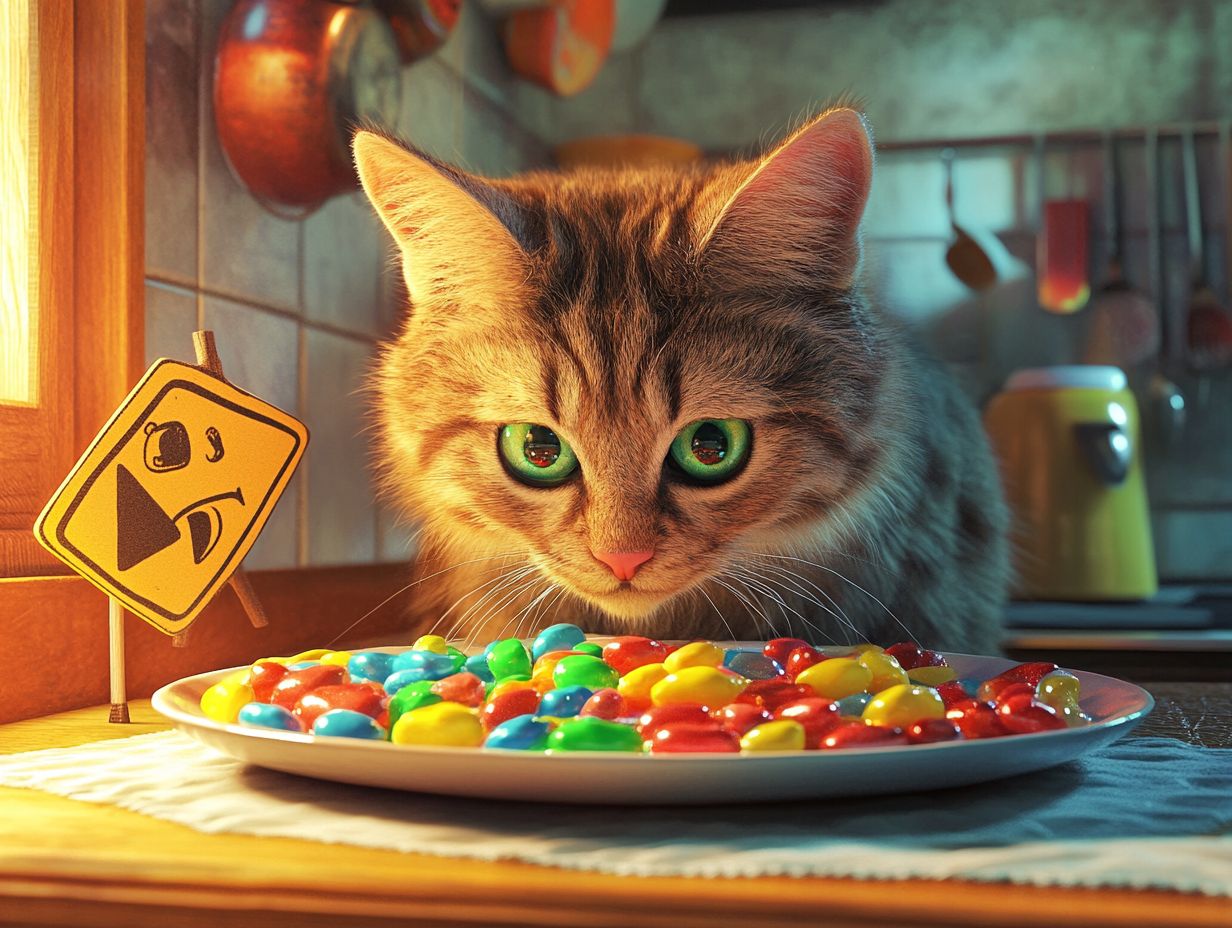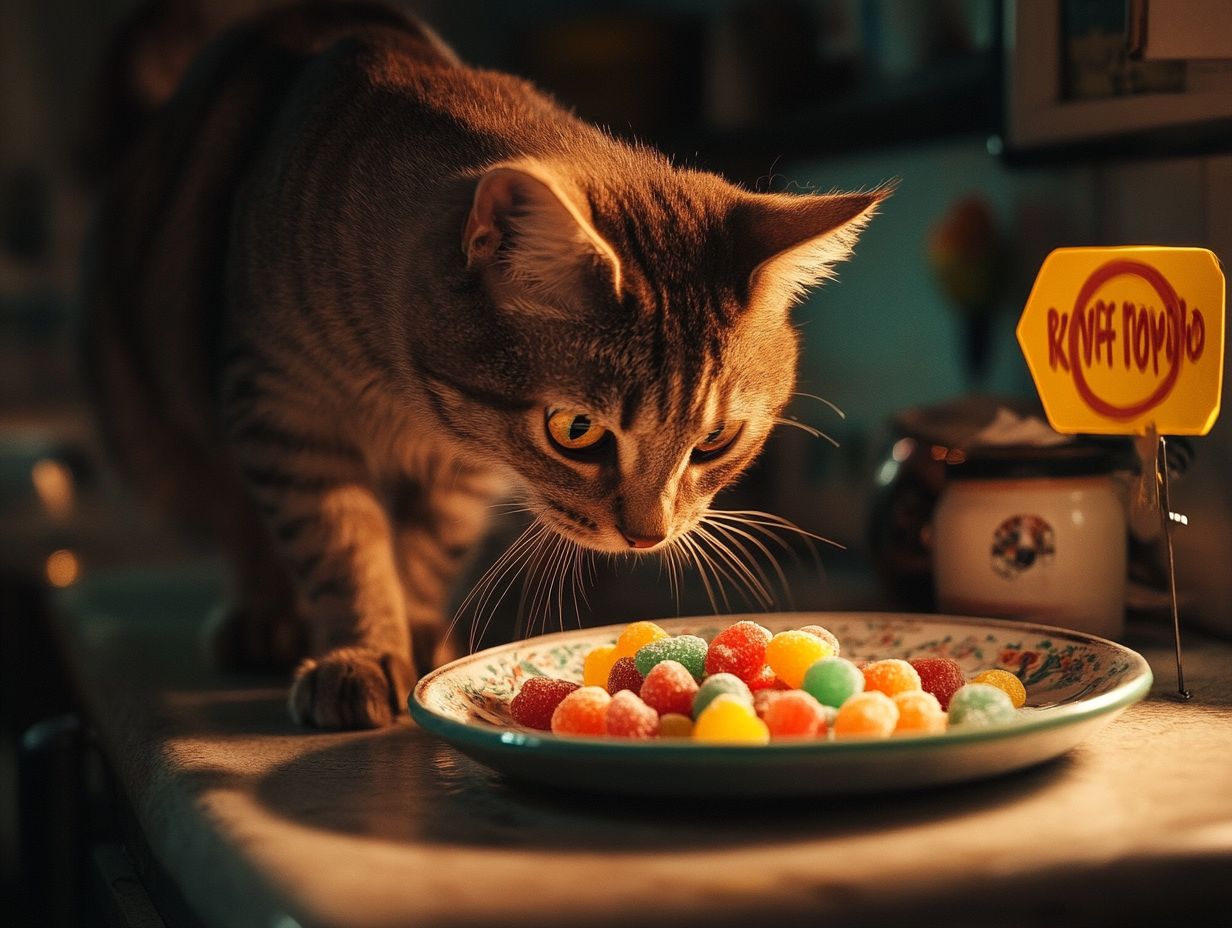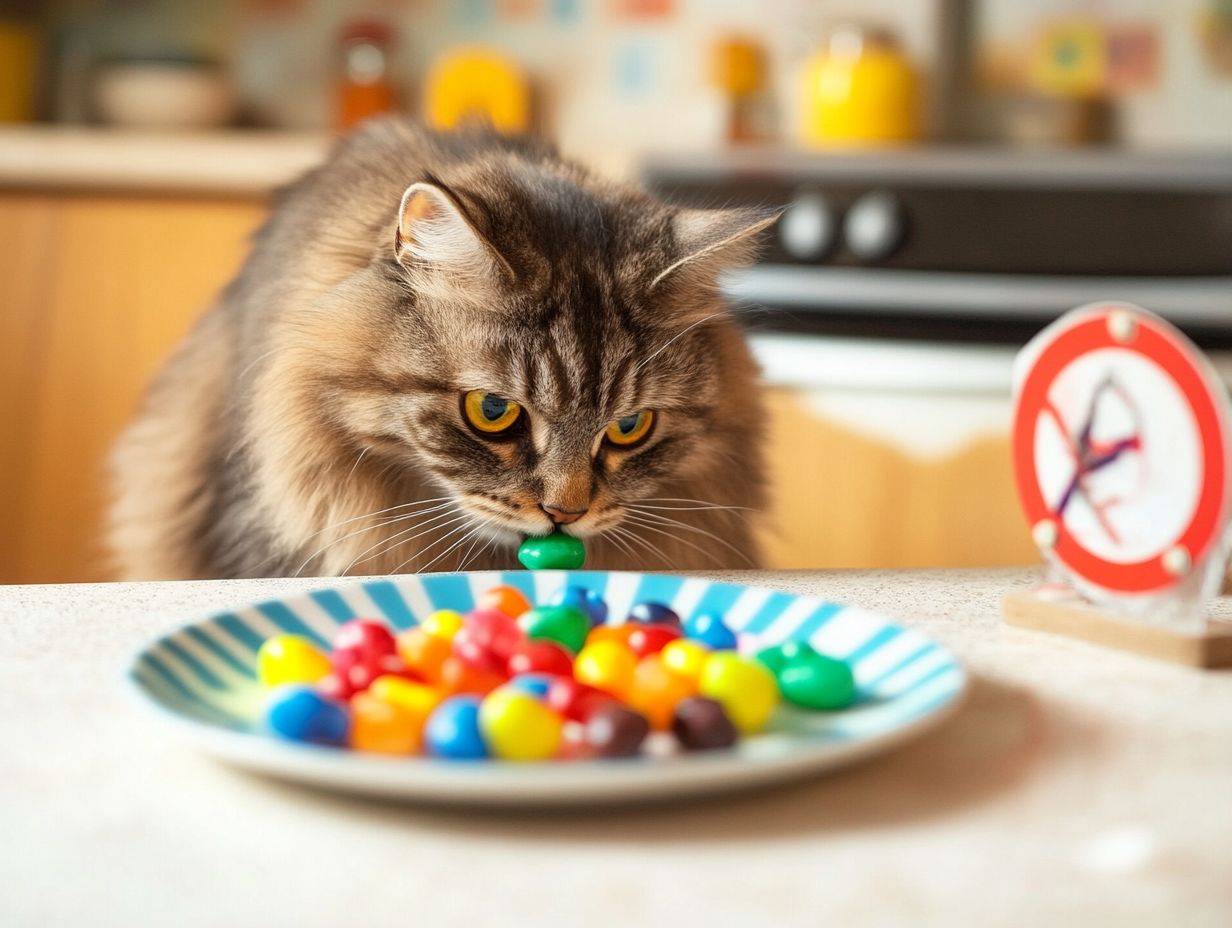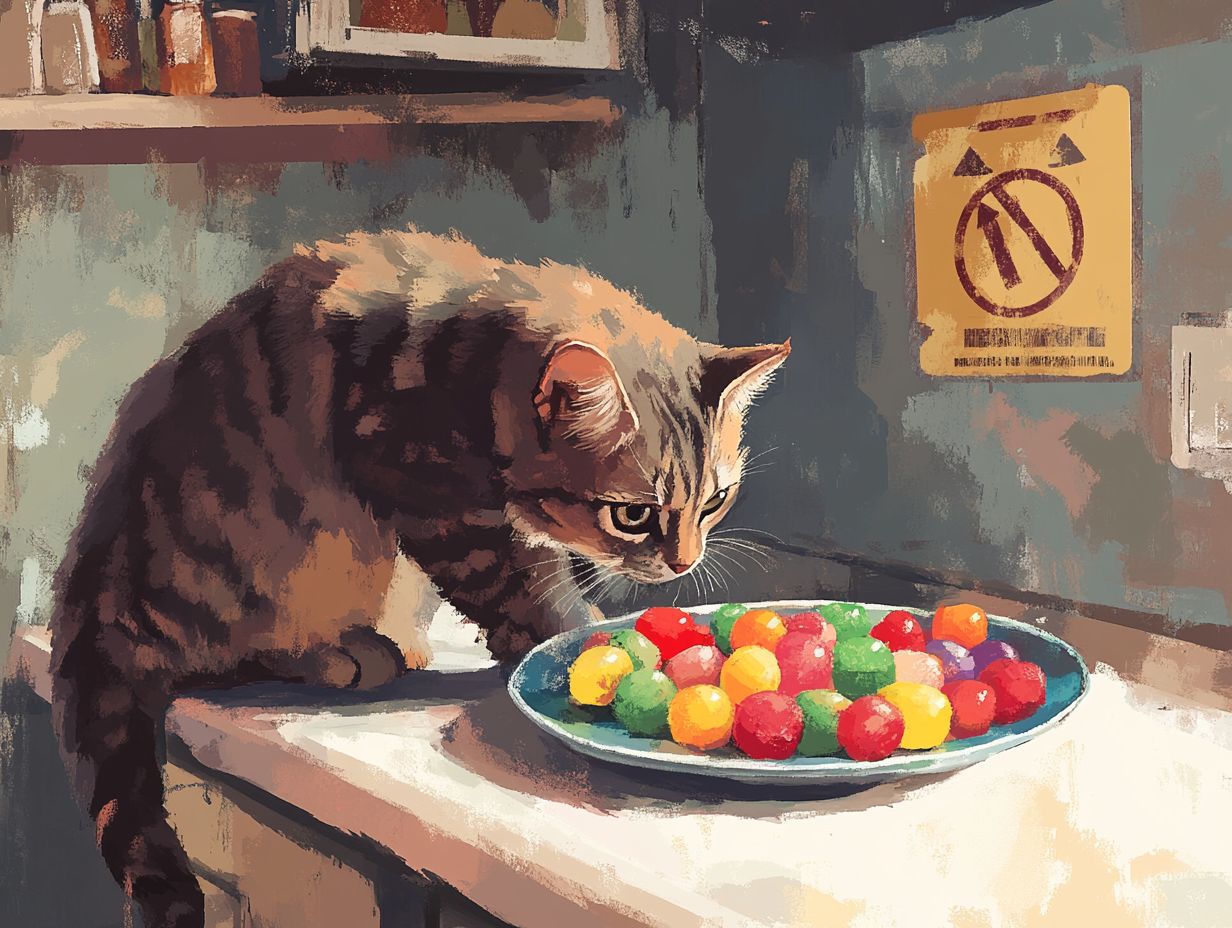If you’re wondering whether your feline friend can indulge in sugary treats like candy or foods containing artificial sweeteners, this piece has the answers you need!
Here’s what you need to know about the relationship between cats and sugar, highlighting their unique dietary needs and the potential health risks involved in sugar consumption.
Understanding the adverse health effects, such as digestive issues, is crucial. Recognizing signs of sugar intolerance—like vomiting or diarrhea—can help you make informed choices for your pet.
Additionally, discover healthier alternatives and tips to keep your kitty away from sweets and other harmful human foods!
Key Takeaways:

- Cats have specific dietary needs; consuming sugar can negatively impact their health, including increasing the risk of obesity and diabetes.
- High sugar intake can lead to significant health risks, making it essential to limit their consumption.
- Consider offering freeze-dried meat treats instead of sugary snacks as a healthy alternative.
- Monitor your cat for signs of sugar intolerance and take necessary measures to prevent excessive sugar consumption.
Overview of Cats and Sugar Consumption
Cats and Sugar: Many people may not realize that certain human foods high in sugar—such as baked goods, sauces, and candy—can be inadvertently fed to cats by their owners. It is essential for cat owners to understand the proper diet for their pets, as feline dietary needs differ vastly from those of humans.
While cats may show curiosity about sugar, its consumption can lead to serious health issues, including obesity and diabetes. Cats lack the digestive enzymes necessary to metabolize sugar effectively, emphasizing the importance of choosing the right cat food.
Understanding Cats’ Dietary Needs
Cats are carnivorous animals, meaning they are primarily meat eaters, which is essential to understand their nutritional needs. They require animal-based proteins, as these are crucial for muscle growth and overall vitality.
Cats lack the enzymes needed to break down carbohydrates, and a diet high in sugars can lead to various health issues, including obesity and diabetes. Ensure their diets include high-quality proteins while limiting carbohydrates to provide balanced nutrition that aligns with their carnivorous instincts, especially during events like holidays when human foods are more accessible.
Can Cats Eat Sugar?
Cats should avoid consuming sugar, as it can negatively impact their health and they are unable to digest it properly.
The Impact of Sugar on Cats’ Health
Excess sugar significantly impacts cats’ health, as excessive sugar consumption can lead to life-threatening conditions such as obesity and diabetes, which are common health risks among felines.
Obesity: Research indicates that nearly 30% of cats in the United States are classified as obese, a condition that can shorten their lifespan and lead to serious health complications, including joint disease and heart failure.
Diabetes: The risk of developing diabetes increases dramatically with excess weight; approximately 1 in 200 cats will develop this condition, often linked to poor dietary choices.
Cats are carnivorous animals and are not well adapted to high sugar levels, which can cause metabolic disturbances with long-term negative effects on their overall health. Understanding these risks can help cat owners make better dietary choices for their pets.
The Dangers of Cats Consuming Sugar

The dangers of cats consuming sugar are considerable, as it can lead to various health problems requiring veterinary intervention.
Obesity and diabetes are two significant issues that can severely affect a cat’s quality of life.
Potential Health Risks and Complications
While small amounts of naturally occurring sugars in fruits are generally safe, added sugars should always be avoided. To maintain your cat’s health, limit any treat to no more than 10% of their daily caloric intake.
Guidelines for Safe Feeding
To ensure your feline stays healthy, provide a balanced diet rich in animal-based proteins and limit sugary snacks. Regularly check for signs of sugar intolerance and consult your veterinarian for tailored advice.
Conclusion
In summary, avoiding sugar is crucial for maintaining your cat’s health. Cats require a balanced diet tailored to their carnivorous nature, which supports their overall well-being. By recognizing the risks of sugar and offering appropriate treats, you can help ensure your feline friend lives a long, healthy life.
As a cat owner, it is crucial to understand the implications of sugar consumption in cats. Cats cannot taste sweetness, which means that their bodies are not equipped to handle sugar. The potential health risks associated with sugar consumption in cats include diabetes and digestive disorders, both of which can lead to serious conditions requiring treatment from a veterinary professional. These issues can significantly impact a cat’s quality of life and overall well-being, making it essential for pet owners to be mindful of the foods they offer their pets. Avoiding human food and sweets like chocolate and grapes is particularly important.
Diabetes may result in weight gain and lethargy, transforming an active cat into a sedentary one. Additionally, digestive disorders caused by excessive sugar intake can lead to discomfort and nutritional deficiencies, further exacerbating health problems for the cat.
When a cat’s health is compromised, behavioral changes often follow, with previously healthy cats becoming irritable and withdrawn, creating stress for both the cat and the owner.
Alternatives to Sugar for Cats
The search for sugar alternatives for cats is crucial, as numerous healthy treat options exist that provide essential nutrients without compromising their health.
Healthy Treat Options for Cats
Healthy treat options for cats include a wide variety of meat-based snacks and specially formulated cat foods that meet their dietary needs without the harmful effects of sugar. You can offer treats such as freeze-dried chicken or tuna, which are high in protein and typically free of harmful additives. A recommended portion size is 1-2 pieces, given as an occasional treat.
Small amounts of cooked salmon or plain, unseasoned turkey can also serve as enjoyable and nutritious rewards, offered no more than 2-3 times a week. Brands like PureBites and Just Cats provide healthy cat treats that are flavorful and contain fewer fillers.
If you prefer to make your own treats, simple options like baked sweet potato or blended pumpkin can be beneficial. These not only appeal to a cat’s taste for the unusual but also support the digestive health of cats who require more fiber in their diets. Offer these homemade treats in small amounts, approximately a teaspoon once or twice a week.
Signs of Sugar Intolerance in Cats
Identifying the signs of sugar intolerance in cats is crucial, as the symptoms can vary and may indicate an underlying disease or other health issues that require medical attention.
Identifying and Addressing Symptoms

Identifying and treating symptoms of sugar intolerance in cats involves closely monitoring their behavior and health. Any signs that appear unusual should be checked with a veterinarian.
- Excessive thirst
- Lethargy
- Vomiting
- Diarrhea
- Changes in appetite
Distinguishing these signs from general illness can be challenging, as many conditions share similar symptoms.
For instance, if a cat suddenly starts eating less or drinking more water, it may indicate a reaction to sugar rather than just a typical illness. In such cases, it is crucial to consult a veterinarian, who can conduct tests and provide recommendations for dietary adjustments.
Prompt veterinary care is essential for your pet’s health and can help prevent complications related to sugar intolerance. For more information, check out Can Cats Eat Sugar? The Dangers of Sweets.
Preventing Sugar Consumption in Cats
Preventing sugar consumption in cats is essential to avoid the associated health risks. This requires practical strategies to keep cats away from sweets and sugary human foods.
Tips for Keeping Cats Away from Sweets
The best way to keep cats away from sweets is to take a proactive approach and understand the associated risks, ensuring that an environment that allows access to sweets is not created in the first place. This foundational step helps prevent cats from developing a taste for sweets or other unhealthy human foods.
- Store sweets and sugary foods securely, out of reach of your cats.
- Establish a feeding schedule to ensure your cat knows when to expect meals, reducing the likelihood of seeking out extra snacks.
- Provide a variety of safe, nutritious treats to satisfy your cat’s cravings without resorting to sweets.
- Educate all household members about the dangers of feeding cats human food.
For a balanced view on feline nutrition, be aware that certain healthy treats may also cause allergies or digestive issues in some cats. Always observe your cat for any adverse reactions when introducing new foods.
In conclusion, avoiding sugar in a cat’s diet is vital for their health and well-being. Regular consultations with a veterinarian for personalized dietary advice can help ensure your feline friend remains happy and healthy.
Introduction
Can cats eat sugar? The short answer is no. Sugar can pose significant risks to feline health, leading to conditions such as obesity and diabetes. Understanding the dangers of sugar and how to keep our cats safe is crucial for responsible pet ownership.
Nutritional Risks of Sugar
Eating sugar can lead to obesity, diabetes, and tooth decay in cats. These conditions require prompt attention from a veterinarian. Signs to watch for include excessive thirst, frequent urination, and lethargy.

Safe Feeding Guidelines
- Store human food, especially items harmful to cats like sweets, in cabinets or containers that are difficult for curious cats to access. This not only keeps sweets out of reach but also establishes a clear distinction between appropriate and inappropriate foods for them.
- Educate your family members on the dangers of feeding cats human food, emphasizing that chocolate, candy, and other sweet treats are strictly off-limits.
- Avoid rewarding cats with sweets or other human foods. Instead, consider offering them catnip or special treats designed specifically for cats. For example, offer no more than one or two small cat treats per day to avoid overindulgence.
Conclusion
In summary, sugar is not safe for cats and can lead to several health issues. By keeping sugary foods out of reach and opting for safe cat treats, you can help ensure your feline friend stays healthy and happy.
Frequently Asked Questions
Can cats eat sugar?
No, cats should not consume sugar as it can be harmful to their health and lead to digestive issues.
What are the dangers of cats eating sweets?
Eating sugar can lead to obesity, diabetes, and tooth decay in cats, requiring prompt attention from a vet.
Can cats eat any type of sugar?
No, cats should not eat any type of sugar, including natural sugars found in fruits and vegetables.
What if my cat accidentally eats something with sugar in it?
If your cat has consumed a small amount of sugar, they will most likely be fine. However, if they have eaten a significant amount, it is best to monitor them for any signs of illness and consult with a veterinarian if necessary. The ASPCA can provide further guidance on toxic foods like chocolate or Xylitol.
Are there any safe alternatives to sugar for cats?
Yes, some safe alternatives exist, such as small amounts of honey or stevia. However, it is always best to consult with a veterinarian or pet boutique expert before giving your cat any new foods, ensuring they are suitable for all cat breeds.
How can I prevent my cat from eating sugar?
Make sure to keep all sugary foods out of reach from your cat, and read ingredient labels on their food to ensure there is no added sugar. Also, avoid giving them any human foods that may contain sugar or Xylitol. According to the ASPCA, these substances are not toxic to humans but can be harmful to cats. Additionally, consider giving your cat grass as a safe and healthy treat.
Resources
For further reading on feline nutrition, check out these reputable veterinary websites: